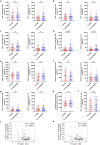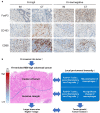Differential immune microenvironmental features of microsatellite-unstable colorectal cancers according to Fusobacterium nucleatum status
- PMID: 32623478
- PMCID: PMC10991456
- DOI: 10.1007/s00262-020-02657-x
Differential immune microenvironmental features of microsatellite-unstable colorectal cancers according to Fusobacterium nucleatum status
Abstract
It has been suggested that Fusobacterium nucleatum (Fn) may differentially impact tumor immune responses according to microsatellite instability (MSI) status in colorectal cancers (CRCs). We aimed to reveal the detailed relationship between intratumoral Fn and immune microenvironmental features in MSI-high CRCs. A total of 126 MSI-high CRCs were subjected to analyses for intratumoral Fn DNA load using quantitative PCR and for densities of tumor-infiltrating immune cells, including CD3+ T cells, CD4+ T cells, CD8+ T cells, FoxP3+ T cells, CD68+ macrophages, CD163+ macrophages, and CD177+ neutrophils, at invasive margin (IM) and center of tumor (CT) areas using computational image analysis of immunohistochemistry. Based on the Fn load, the 126 MSI-high CRCs were classified into Fn-high, -low, and -negative subgroups. The Fn-high subset of MSI-high CRCs was significantly correlated with larger tumor size and advanced invasion depth (p = 0.017 and p = 0.034, respectively). Compared with the Fn-low/negative subgroup, Fn-high tumors demonstrated significantly lower density of FoxP3+ cells in both IM and CT areas (p = 0.002 and p = 0.003, respectively). Additionally, Fn-high was significantly associated with elevated CD163+ cell to CD68+ cell ratio in only CT areas of MSI-high CRCs (p = 0.028). In conclusion, the Fn-enriched subset of MSI-high CRCs is characterized by increased tumor growth and invasion and distinct immune microenvironmental features, including decreased FoxP3+ T cells throughout the tumor and increased proportion of M2-polarized macrophages in the tumor center. These findings collectively support that Fn may be linked to pro-tumoral immune responses in MSI-high CRCs.
Keywords: Colorectal carcinoma; Gut microbiome; Gut microbiota; Tumor immunity; Tumor immunology.
Conflict of interest statement
The authors declare no conflict of interest.
Figures



Similar articles
-
Intratumoral Fusobacterium nucleatum abundance correlates with macrophage infiltration and CDKN2A methylation in microsatellite-unstable colorectal carcinoma.Virchows Arch. 2017 Sep;471(3):329-336. doi: 10.1007/s00428-017-2171-6. Epub 2017 Jun 8. Virchows Arch. 2017. PMID: 28597080
-
Immune microenvironmental heterogeneity according to tumor DNA methylation phenotypes in microsatellite instability-high colorectal cancers.Cancer Immunol Immunother. 2024 Sep 5;73(11):215. doi: 10.1007/s00262-024-03805-3. Cancer Immunol Immunother. 2024. PMID: 39235590 Free PMC article.
-
Clinical significance of programmed cell death-ligand 1 expression and the immune microenvironment at the invasive front of colorectal cancers with high microsatellite instability.Int J Cancer. 2018 Feb 15;142(4):822-832. doi: 10.1002/ijc.31107. Epub 2017 Oct 31. Int J Cancer. 2018. PMID: 29044503
-
Association of Fusobacterium nucleatum with immunity and molecular alterations in colorectal cancer.World J Gastroenterol. 2016 Jan 14;22(2):557-66. doi: 10.3748/wjg.v22.i2.557. World J Gastroenterol. 2016. PMID: 26811607 Free PMC article. Review.
-
Molecular and prognostic heterogeneity of microsatellite-unstable colorectal cancer.World J Gastroenterol. 2014 Apr 21;20(15):4230-43. doi: 10.3748/wjg.v20.i15.4230. World J Gastroenterol. 2014. PMID: 24764661 Free PMC article. Review.
Cited by
-
Intratumoral Microbiota: Metabolic Influences and Biomarker Potential in Gastrointestinal Cancer.Biomolecules. 2024 Jul 27;14(8):917. doi: 10.3390/biom14080917. Biomolecules. 2024. PMID: 39199305 Free PMC article. Review.
-
Clinicopathological differences of high Fusobacterium nucleatum levels in colorectal cancer: A review and meta-analysis.Front Microbiol. 2022 Nov 4;13:945463. doi: 10.3389/fmicb.2022.945463. eCollection 2022. Front Microbiol. 2022. PMID: 36406461 Free PMC article. Review.
-
Local Breast Microbiota: A "New" Player on the Block.Cancers (Basel). 2022 Aug 5;14(15):3811. doi: 10.3390/cancers14153811. Cancers (Basel). 2022. PMID: 35954474 Free PMC article. Review.
-
Identification of signatures associated with microsatellite instability and immune characteristics to predict the prognostic risk of colon cancer.Open Med (Wars). 2024 Dec 20;19(1):20241056. doi: 10.1515/med-2024-1056. eCollection 2024. Open Med (Wars). 2024. PMID: 39726813 Free PMC article.
-
New Relevant Evidence in Cholangiocarcinoma Biology and Characterization.Cancers (Basel). 2024 Dec 19;16(24):4239. doi: 10.3390/cancers16244239. Cancers (Basel). 2024. PMID: 39766138 Free PMC article. Review.
References
MeSH terms
Grants and funding
LinkOut - more resources
Full Text Sources
Medical
Research Materials
Miscellaneous

